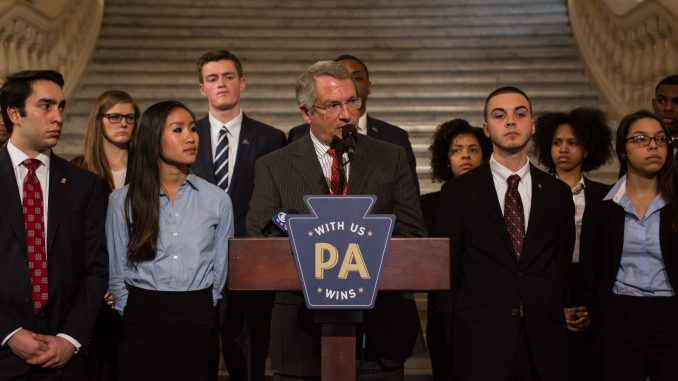
As Pennsylvania’s budget crisis continues, state-related universities like Temple are feeling repercussions. The state still has not doled out yearly appropriations to universities, and if a budget is not passed by June 30, appropriations would likely not be given at all.
Administrators said that if Temple does not receive its annual $175 million from the state, it will have to stop working on certain programs and reshuffle the money it does have.
“It causes us to pause, and instead of pushing forward on certain projects or innovations, we’re really hesitant to do that at this point,” said Ken Kaiser, Temple’s CFO and treasurer. “It’s really unprecedented and we’re holding back on a lot of things because if that money doesn’t come through then it’s going to be somewhat of a nuclear situation.”
The university has taken out a line of credit worth $100 million from PNC with a fluctuating interest rate in order to make sure it has the cash on hand to be able to run the university, Kaiser said.
“For the university it would mean liquidating other assets—funds that had been set aside for other initiatives and new programs would have to fill that hole—it would be forgoing things that have been planned for,” Kaiser said.
The already indebted Temple University Hospital will also suffer if the budget is not passed, Kaiser said.
“There are ways that we leverage some of our money to help them get additional federal dollars—they would lose about $20 million,” Kaiser said. “It could impact the way they’re able to deliver healthcare.”
Kaiser is worried if Temple does not get the state money that they have been promised, it will turn into a private university. Of the “City Six” universities in Philadelphia, Temple is the only semi-public university.
Earlier this month, Temple Student Government spearheaded a social media barrage to press politicians to pass the budget, along with student governments from Lincoln, University of Pittsburgh and Pennsylvania State University.
“Something that [Gov. Tom Wolf] ran on was higher-education funding and a year into his term we are yet to see any money, let alone an increase, and that’s discouraging,” said Student Body President Ryan Rinaldi.
On March 2, TSG representatives went to Harrisburg along with President Theobald and other administrators to attend the appropriation hearings.
Theobald and representatives from the three other state-related universities—Penn State, the University of Pittsburgh and Lincoln University—testified about possible issues if a budget is not passed by June 30. Theobald said no budget could severely impact the services Temple’s healthcare system provides.

“Temple has done its part,” Theobald told the appropriations committee.
Later on in the hearing, Theobald also highlighted the Temple Option, which allows university applicants to forgo submitting SAT or other standardized test scores. He also spoke about Fly in 4, the university’s plan to help students graduate in four years.
After Theobald and the other three state-related representatives finished testifying, state representatives questioned them about what their university has been doing to deal with the budget crisis, along with general updates on university affairs.
State Rep. Matthew Bradford, a Democrat who represents the state’s 70th district in Norristown, criticized the state legislature for its current $2-billion structural deficit, and said state legislators are “failing its students.”
Immediately following Bradford’s testimony, Rep. William Adolph, the Republican chairman of the House Appropriations Committee, declined to respond.
“I’m passionate about supporting education funding,” Bradford told The Temple News after the hearing. “This is a really unfortunate situation that our politics got so dysfunctional.”
“To the average voter or to the affected citizen, of course, the blame will go on all of us,” he said. “But the reality is Tea Party politicians that believe in obstruction and don’t believe in compromise or collaboration have really taken hold in Harrisburg in a way that is unfortunate and is tying up good things, including a balanced, timely budget.”
Rinaldi believes if the university raises tuition it would negatively impact students and enrollment.
“It would be detrimental to the mission of Temple, and it would really hurt enrollment. There are a lot of students who pay tax dollars and go to school for a discount and it’s incredibly concerning to think that tuition could nearly double for in-state students and that would hurt enrollment a lot,” Rinaldi said.
Theobald said at a press conference following last Wednesday’s meetings in Harrisburg that tuition would increase without a budget, but added he wasn’t sure by how much.
“This is really one of our biggest concerns,” said Patrick Gallagher, Pitt’s chancellor. “The support is great, but it’s time to act … let’s get agreement, and let’s move forward.”
Steve Bohnel and Jonathan Gilbert can be reached at news@temple-news.com or on Twitter @TheTempleNews.


Be the first to comment